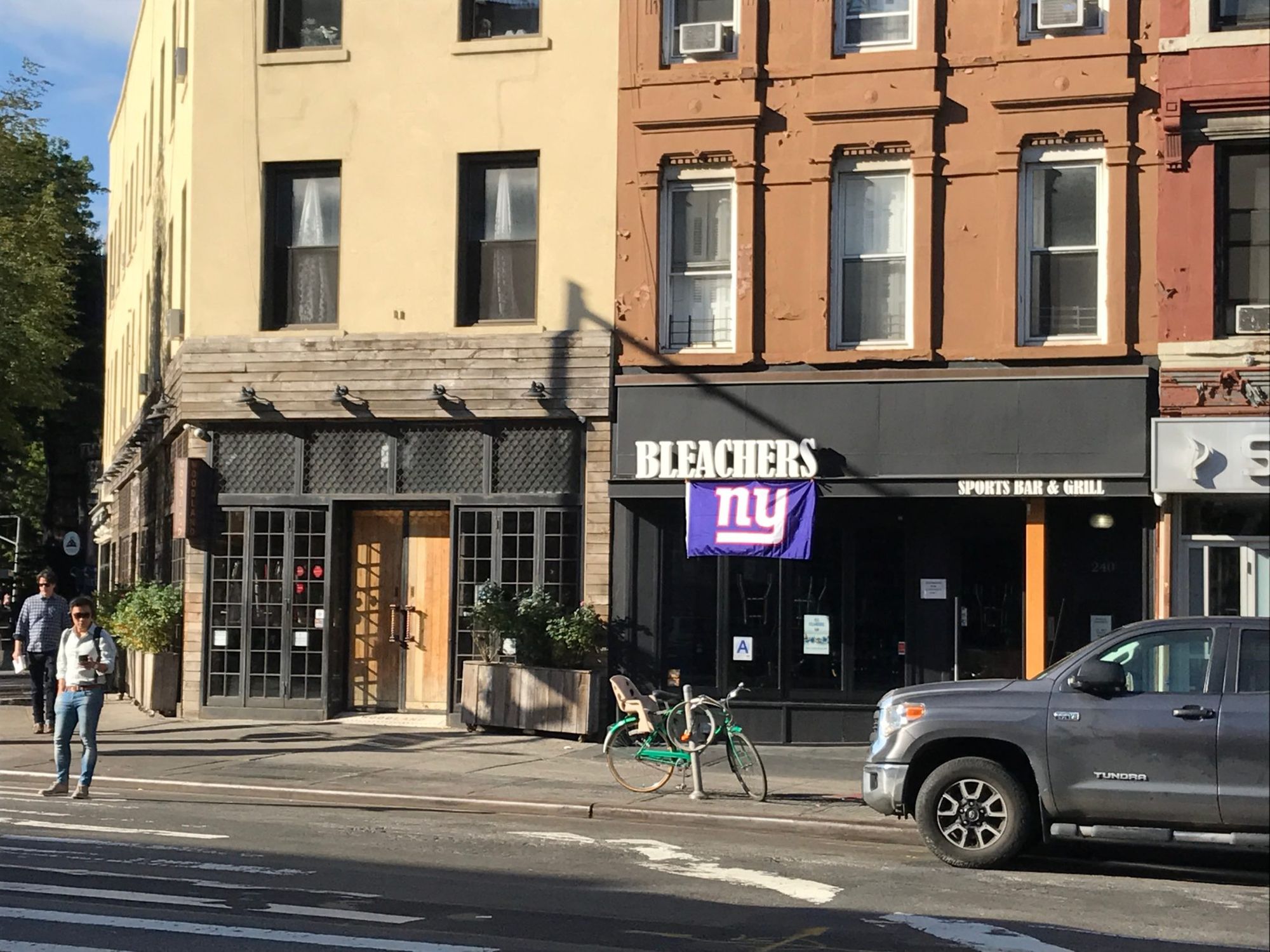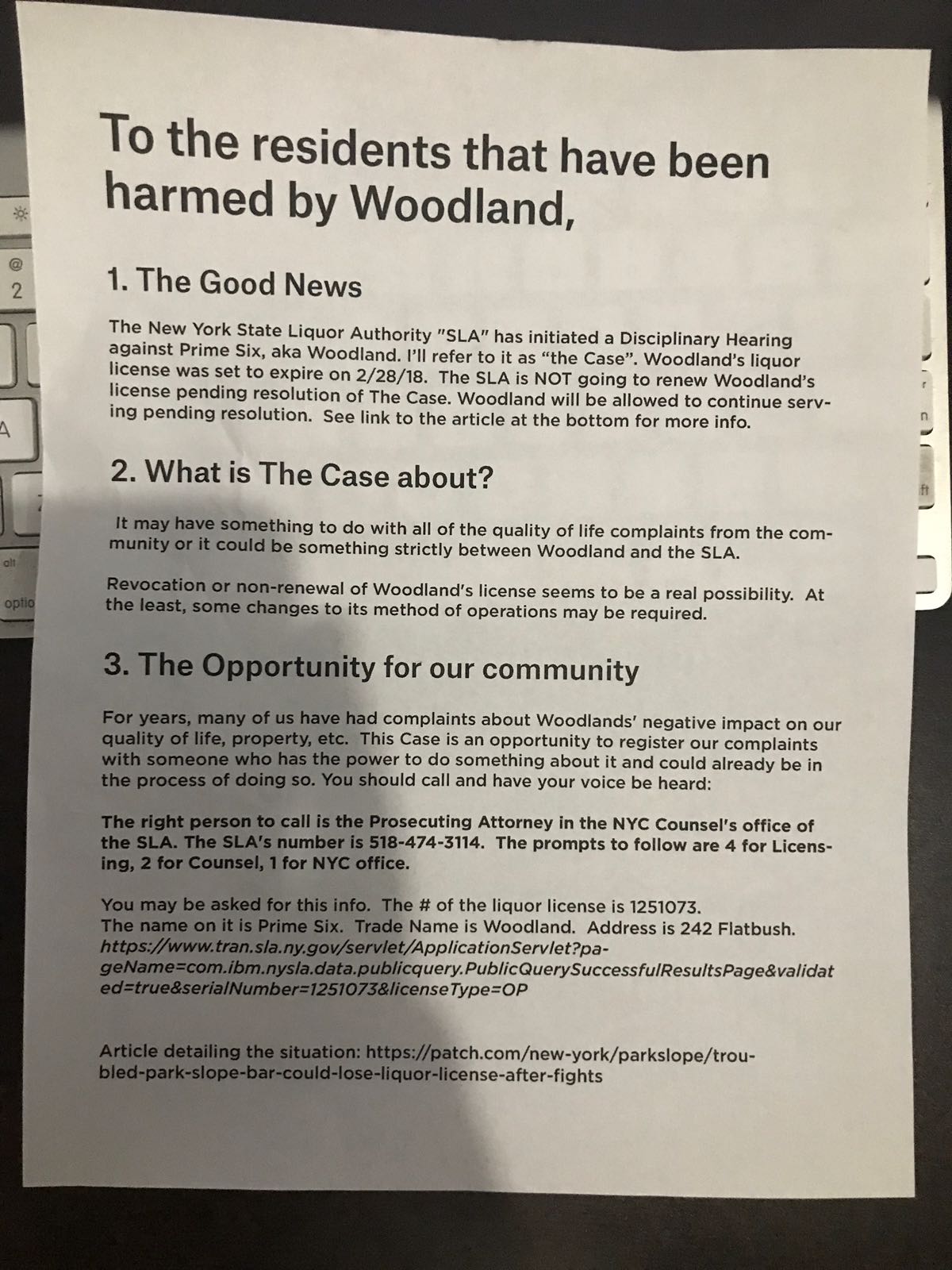Woodland Settles With SLA On Liquor License Renewal

PARK SLOPE – Woodland, the controversial bar/restaurant that has been the cause of ire for many of its neighbors since opening in 2012, settled with the State Liquor Authority (SLA) last week to renew its liquor license.

Located at 242 Flatbush Avenue at the corner of 6th Avenue, Woodland has been the source of a multitude of complaints in the community, ranging from public drunkenness to loud music, and violence. Neighbors say they endure drunk patrons vomiting, urinating, or performing sexual acts on their stoops every weekend when the venue hosts its $20 bottomless mimosa brunch.
The SLA scheduled a hearing on Thursday, April 19, regarding the renewal of Woodland’s liquor license amid five charges filed against the business from October 1 through November 10, 2017, including three incidents in which the premises became “disorderly”; the venue’s failure to “exercise adequate supervision”; and an incident that made Woodland “a focal point of police attention,” according to the Atlantic Yards/Pacific Park Report.
The hearing was cancelled because Woodland’s owner, Akiva Ofshtein, pleaded “no contest” and offered a $10,000 settlement. Ofshtein told BKLYNER Wednesday morning that his lawyer advised him that the SLA would likely fine him a minimum of $10,000 so it would have been pointless to argue the charges.
At a follow-up meeting on Monday, May 2, the SLA agreed to dismiss all charges if Ofshtein agreed to pay a $12,000 fine, though one of the members of the panel noted, “we do have further charges coming on this.” Woodland has a month to pay, according to Patch, and the charges will remain on the venue’s SLA file making it easier to take away their license in the future. Ofshtein told BKLYNER that his lawyer is currently handling the settlement process for him.
Woodland’s liquor license expired in February 2018 but the venue has been allowed to continue operations “during disciplinary proceedings until they’re resolved,” Patch reported.
In March, Brooklyn Community Board 6 (CB6) voted unanimously against approving the renewal of a liquor license application for Woodland. Members of the committee suggested Woodland’s backyard hours be restricted—closing one hour earlier—and that the venue open later on Sundays—at 4pm instead of noon—until conditions improve and the number of complaints decrease.
Resident Steve Ettlinger who has experienced many quality of life issues in the neighborhood over the years told BKLYNER, “A lot of the neighbors view this as a longterm problem that goes way beyond the disorderly premises and police action that seems to have caught the attention of the SLA. It involves many more problems with quality of life issues, some of which the management has tried to address with an extra security person and signage, but they remain a troublesome neighbor.”
“In terms of the music being so disruptive, they need to invest money in building a solid wall to contain the sound,” Ettlinger added. “Elsewhere in the city there are a lot of places with live music where you can’t hear the music on the street and that’s the way it should be. They need to keep their sound inside and obviously stop serving people to the point where they’re throwing up on our street. It happens almost every weekend.”
“The neighbors in general are urban dwellers and presumably they recognize that life in the big city means there’s going to be some disruptive behavior from time to time, but this is a constant and it’s really egregious, especially with the throwing up and the sex on our stoops.”
Following the Community Board’s vote, Ofshtein told BKLYNER that he had taken several measures over the years to address neighbors’ concerns, including most recently installing barriers to help control the weekend crowds and stationing a security guard at the corner of St. Marks and 6th Avenues, but he refused to cut four hours from one of Woodland’s busiest periods, saying, “I don’t think they’re being reasonable.”

“I’m at the stage where I’ve done everything I can to keep it under control,” Ofshtein said Wednesday, and insisted, “We are going to continue to do what’s right for the community, trying to be a successful, profitable, and safe place to visit.” He adds that any other busy restaurant would not face the same opposition from the community and believes many of the complaints stem from Woodland having a “majority minority clientele.”
“What we’ve done to appease the community, it’s beginning to feel like there’s a racial component to it,” he said. “I firmly believe it’s because we mainly have an African-American and Caribbean-American clientele,” he added.
“The only people to bring up racial issues have been the owners and some members of the city government,” Ettlinger argues. “I’ve been watching this unfold since 2011. Among my many neighbors, whether we’re speaking face to face on the street, at meetings, or via email, not one has ever brought up anything with racial overtones. I have never had any problem whatsoever, and I don’t think any of my neighbors have had any problem whatsoever, with a racial tinge.”
“I think it’s really important to eliminate any question of race from the discussion here,” Ettlinger continued. “We’re talking vomit, we’re talking sex acts, we’re taking decibels, we’re talking parking at a hydrant, and we’re talking about SLA laws that have to be enforced by police action, which is not normal. None of those things are normal and not one of those complaints has a racial edge.”
“Woodland’s owners alway say, ‘There are two other bars next-door to us. You can’t blame it all on us,’ but the fact is it’s pretty clear that it’s the Woodland clientele,” Ettlinger insists. “Sometimes they are carrying bags with leftovers that say, ‘Woodland,’ sometimes they’re talking about Woodland. We have asked them and they’ve said they were at Woodland.”
“I don’t want that to be an empty storefront,” Ettlinger adds. “I would like them to succeed. I think they can find a way to make money, maybe less than they’re making now, without over-pouring and without over-serving their customers to the point of making them sick.”




